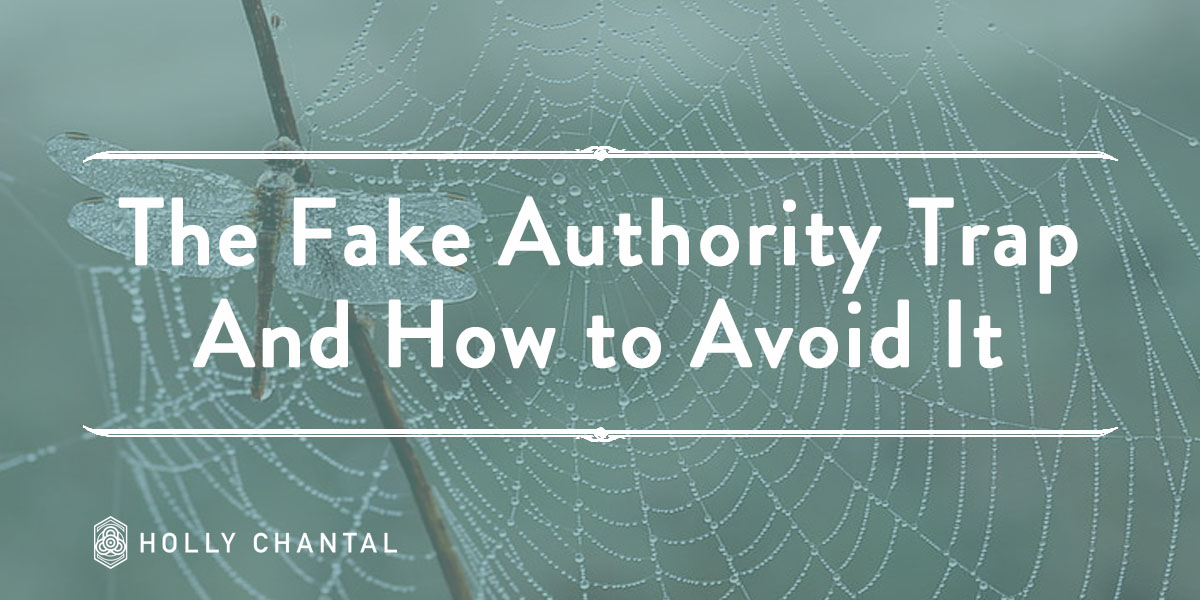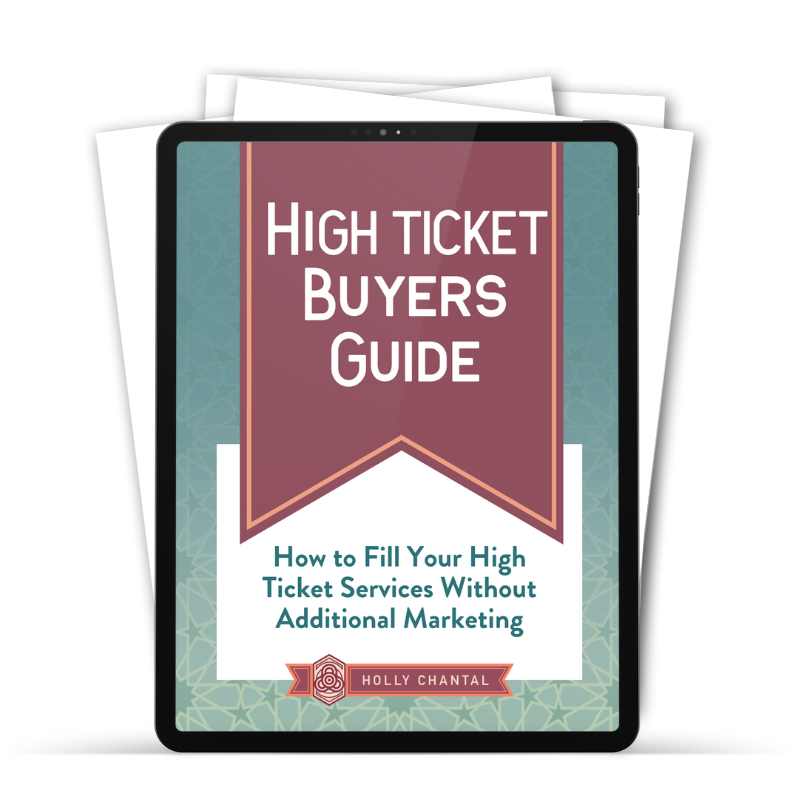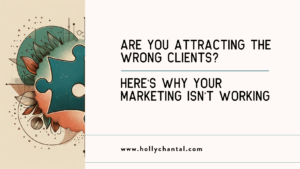When I was six, I almost drowned.
I was at a friend’s house with a pond. “Let’s go swimming!” he said. His mother asked me, “Holly, can you swim?” “Of course, I can!” was my confident answer. After all, I’d gone into the shallow water at a lake near my house – one where I could touch the bottom and go out a long way.
I took two steps into the pond (which had no sides) and, under I went.
The next thing I remember was being carried into the house coughing up what felt like half of the pond. By telling my friend’s mother I could swim I had created fake authority – it was only true “in a way”, but she took my words at face value because I told her so.
When you make a claim that sounds like a much greater accomplishment than it actually is, that’s fake authority.
Now, you may be thinking that this is not something you would do because obviously you’re not a liar – but here’s the thing. Fake authority is a trap.
There are very smart marketers selling coaches fake authority opportunities and you wouldn’t even realize it (unless you know what you’re looking for). I’ll share more on what these traps look like and how to avoid then, but first let’s dig a little deeper into the differences between fake authority and real authority.
So, how do you tell the difference between fake and real authority and why does it matter?
As a business owner, you share your experience in your marketing as a way to demonstrate credibility and position yourself as an expert.
Whether your claims are “the whole story” or not, they still make you look like an authority.
For example, have you seen coaches post a picture on Facebook of them with their favorite “guru” and it looks like they are besties? The picture implies “I know this person; I’m on their level!” What that picture doesn’t mention is that they may have waited in line to have their picture taken, and the person they took it with wouldn’t even be able to tell you their name. Not a lie, but also not an accurate message.
The thing about authority is that whether it’s fake or real, it still positions you as an expert.
You’ll feel more confident (at first) and you’ll also be more likely to attract more of “that thing” like speaking engagements if you’ve shared that you’ve spoken on sought after stages, or joint venture partners because your new partner is friends with someone you appear to know.
Even though it looks like fake authority and real authority produce the same results, the former has the nasty side effect of possibly ruining all credibility if someone calls your bluff.
First off, you can’t fool yourself. While you might get the same positive results at first, youknow when your claims aren’t real, and that hurts your confidence.
Plus, people are really catching on to false claims. The truth will come out as you are asked deeper questions. No one wants to be manipulated. When people realize you’ve overstated yourself, you run the chance of being called a fraud (or at least thought of as).
That all said, let’s get back to the fact that you’re obviously not a liar, and you’re probably not intentionally creating fake authority.
So, how do you recognize a fake authority trap so you can avoid it?
If you’re paying to do something so that you can look more credible, you’re creating fake authority (and it’s SO EASY to do). There are so many tempting ways to put yourself out there that promise you a shortcut to being seen as an authority, but these “opportunities” rarely deliver what they promise. Here are just some examples:
1. Buying a speaking engagement on a prominent stage.
Last year I was asked to speak at a coach’s conference being held at Harvard University. “Oh, happy day!” right? Not only was the conference specifically for my target audience, I could put Harvard on my list of places I’ve spoken which would carry some pretty awesome clout.
That’s when things got sketchy. You see, there was a hefty price tag involved in speaking at this event AND I would only be on the stage for about 5-10 minutes. Now, I’ve sponsored events before and paid to speak on stage, that’s not unusual. But I realized very quickly that the focus of this event was solely so that participants could say they spoke at Harvard in their bios, and they were cramming as many speakers on stage as possible because that was how they were making their money. No, thank you.
2. Buying into a co-authored book.
You, too, can purchase your own little byline from a publisher saying you were featured in a book with such famous people as Jack Canfield, Oprah Winfrey, or Deepak Chopra, although they have no earthly idea who the heck you are.
I know because when I was first starting out, I “co-authored” a book with a whole lotta other anonymous people and two well-known gurus. All I had to do was pay some money, submit my article, and BOOM I was an author that appeared alongside one of the greats! (They even made sure that MY copies of the books had my photo on the front with the headliners.)
What was my return? Zero sales and zero clients, not to mention the 150 unsold paperbacks. What really kills me about this one was that I could have put that money to so much better use, especially when I was just starting out!
3. Buying time to be interviewed by an industry leader.
This is the latest offer I’ve seen and it’s what drove me to cover this topic. In this example, the name was big, the cost was high, and there was incredible hype around buying a slot and having an “interview” recorded with this very well-known industry guru.
The whole pitch was about what an expert you’d look like if this amazing person was interviewing YOU.
4. Paying to be a best-selling author on Amazon (sort of).
There are ways to game the fancy algorithms and become an Amazon best-seller, and there are people you can hire that literally guarantee best-seller status. This one is only half-fake because you WILL be an Amazon best-seller, and you will have written the book (in most cases) so you are the expert. The problem with this offer is that being an Amazon best-seller doesn’t mean the same thing as being a “best-seller” anymore because it is well known how easy it is to do.
So, I’m putting this one on the list because I still feel like many coaches are being duped into thinking they are going to skyrocket their speaking career, and build ultimate authority by buying into these programs.
Do these smell fake to you? I’m sure they do, in this context of course, but here’s the thing… These offers look really good when they’re landing in your inbox, it isn’t until after the fact that you realize you’re buying fake authority.
So if you’ve participated in any of these, don’t beat yourself up! I didn’t write this article to shame anyone (except for maybe the people selling these “opportunities”) and most everyone has done one of these at one point or another.
Honestly, sometimes the opportunity is still worth it, if you’re doing it for the right reasons (for example, the Harvard speaking gig could have still been a revenue builder because I would have been in front of and networking with a lot of coaches in my target audience.)
Blazing your own trail means not getting in someone else’s line. Instead of spending money you can’t afford, invest that time and your resources into building REAL authority.
You want to speak on big stages? Pick one and make a plan for getting there. You want to be interviewed by an industry leader? Pick one and find a way to get connected.
You will be pleasantly surprised at how doable these things are with honest effort AND what other benefits you’ll receive along the way.
The truth is, you don’t need fake authority. You are already 100% authentically awesome and that’s the “you” the world wants to see and work with.
I’m glad someone was there to pluck my six-year-old-self out of the water those many years ago, and my hope is that this article will do the same for someone else.





